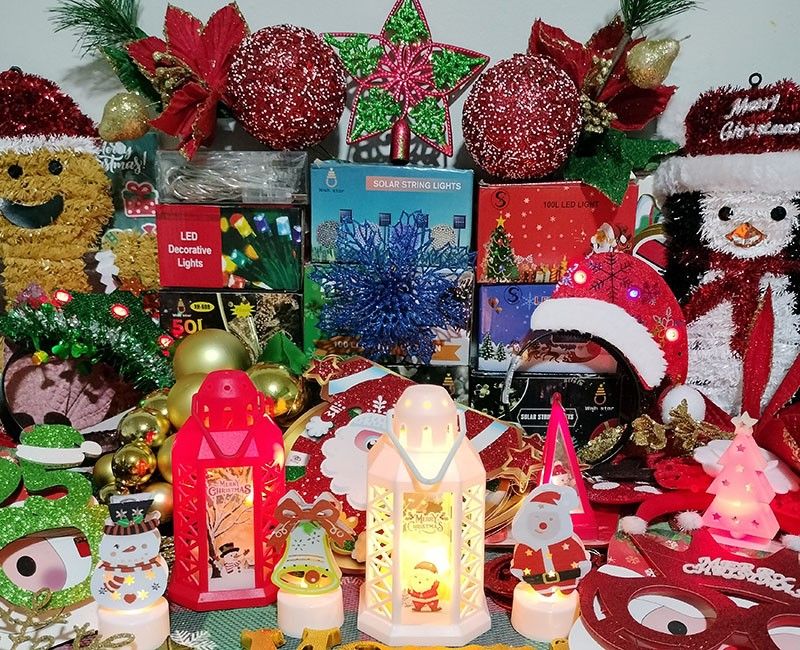Christmas decorations may contain toxic substances — group

MANILA, Philippines — The holiday sparkle of Christmas, with its twinkling lights and glittering decorations, may be concealing hidden dangers, an environmental group has warned.
As the festive season approaches, many are eager to decorate their homes.
However, on Monday, November 4, EcoWaste Coalition cautioned the public about the potential health risks posed by certain Christmas ornaments.
“It’s again the time of the year when homes, schools, offices and everything else are adorned with things that add to the magic of Christmas. However, not all Christmas decorations are created equally,” EcoWaste National Coordinator Aileen Lucero said.
To assess safety levels, the environmental group purchased 55 assorted Christmas decorations from stores in Binondo and Tondo, Manila; Monumento, Caloocan; and Cubao, Quezon City.
The items included star-shaped lanterns called “parols”, Christmas lights, garlands, tree ornaments and figurines of iconic holiday characters like Santa Claus and the Gingerbread Man.
EcoWaste used a handheld X-Ray Fluorescence (XRF) device to analyze the chemical composition of popular Christmas decorations in the Philippines.
The findings revealed alarming levels of metals, including cadmium, lead and bromine, as well as the presence of microplastics.
"Some [decorations] may contain ingredients or components that pose a threat to our health, as well as the environment,” Lucero said.
What toxic substances were found?
In parols. Cadmium concentrations in three of the polyvinyl chloride (PVC) parols exceeded 100 parts per million (ppm), surpassing the European Union's regulatory limit for plastics.
Citing the World Health Organization, EcoWaste said that cadmium is a human carcinogen that may have toxic effects on one’s kidneys, skeletal and respiratory systems.
In Christmas lights. Meanwhile, 10 of the Christmas lights purchased by the group failed to meet quality and safety standards, as they lacked the Philippine Standard (PS) mark or Import Commodity Clearance (ICC) sticker certifying compliance.
The group also discovered that the cords of five Christmas lights contained lead levels two to seven times higher than the EU's 1,000 ppm limit for hazardous substances in electrical and electronic products.
According to the EU, lead exposure can accumulate in the body, posing risks of neurotoxicity and potential harm to breastfed or unborn children.
In Christmas balls and headbands. EcoWaste detected significant levels of bromine and antimony in a set of Christmas balls and Christmas-themed headbands.
“The detection of significant levels of bromine in these items would indicate probable use of recycled plastic from electronic waste with brominated flame retardant (BFR) chemicals,” the group said in a statement.
EcoWaste explained that BFRs are detrimental to the development of the nervous system, potentially leading to learning and memory issues, reduced IQ, thyroid disruption and decreased fertility due to their "highly persistent chemicals."
In assorted Christmas ornaments. The group warned that battery-powered decorations could pose health risks, particularly to children, if not securely fastened. These small button cell batteries, which they found in some of the ornaments they purchased, may contain lithium, manganese, or zinc silver.
“Young children may play with these decorative items and accidentally ingest or insert the tiny battery into her/his ear and nose, which may lead to choking and chemical burns in the digestive tract, ear canal and nasal cavity,” EcoWaste said.
In glitter-filled embellishments. Thirteen of the assorted Christmas decorations were coated in glitter, which the group said is a blend of aluminum and plastic that poses a threat to aquatic organisms due to its small particle size.
In October 2023, the EU banned products containing loose plastic glitter that could shed, to reduce microplastic pollution, unless the glitter is biodegradable or soluble.
Alternatives. EcoWaste encouraged consumers to opt for more environmentally friendly alternatives, such as parols made from paper, bamboo, palm leaves or other plant-based materials.
To prevent potential fire hazards or electric shocks from Christmas lights, buyers should ensure these decorations have an authentic PS mark or ICC sticker. The Department of Trade and Industry lists certified Christmas light brands.
EcoWaste also advised against purchasing Christmas ornaments with button-cell batteries that are not securely packaged. Decorations made from recycled black plastic parts should be avoided unless a regulatory agency has certified them as safe due to their potential BFR chemical content.
The group encouraged choosing plastic-free adornments and creating Christmas decorations using safe, recyclable materials such as wrappers, product containers, tin cans, bottles, mason jars, paper boxes, toilet paper rolls and magazines.
- Latest
- Trending





























